Toyota C-HR vs VW ID.4 – Differences & prices compared
Compare performance, boot space, consumption and price in one view.
Find out now: which car is the better choice for you – Toyota C-HR or VW ID.4?
The Toyota C-HR (SUV) comes with a Full Hybrid or Plugin Hybrid engine and Automatic transmission. In comparison, the VW ID.4 (SUV) features a Electric engine with Automatic transmission.
When it comes to boot capacity, the Toyota C-HR offers 447 L, while the VW ID.4 provides 543 L – depending on how much space you need. If you’re looking for more power, decide whether the 223 HP of the Toyota C-HR or the 340 HP of the VW ID.4 suits your needs better.
In terms of consumption, the values are 0.80 L per 100 km for the Toyota C-HR, and 15.60 kWh for the VW ID.4.
Price-wise, the Toyota C-HR starts at 29100 £, while the VW ID.4 is available from 34600 £. Compare all the details and find out which model fits your lifestyle best!
VW ID.4 Video
Toyota C-HR
The Toyota C-HR stands out with its distinctive and bold design that combines sleek, angular lines with a sporty posture. Its comfortable and stylish interior is equipped with advanced technology features, providing a seamless driving experience. The vehicle offers impressive handling and performance, making it a compelling choice for those who appreciate a blend of practicality and flair on the road.
details @ Toyota
@ Toyota
 @ Toyota
@ Toyota
 @ Toyota
@ Toyota
 @ Toyota
@ Toyota
 @ Toyota
@ Toyota
VW ID.4
The VW ID.4 represents Volkswagen's commitment to the electric vehicle market, combining contemporary design with sustainability. Its spacious interior and intuitive technology make it an attractive choice for those seeking comfort and innovation in an eco-friendly package. With a focus on electric performance and practicality, this car is set to be a popular option among environmentally-conscious drivers.
details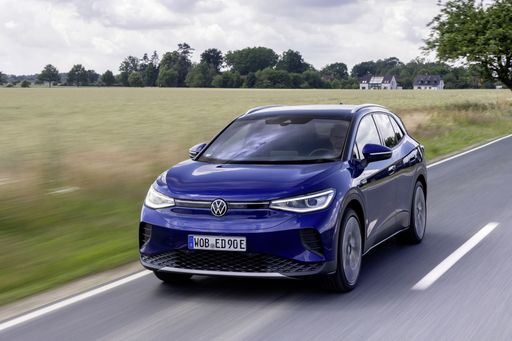 @ Volkswagen
@ Volkswagen
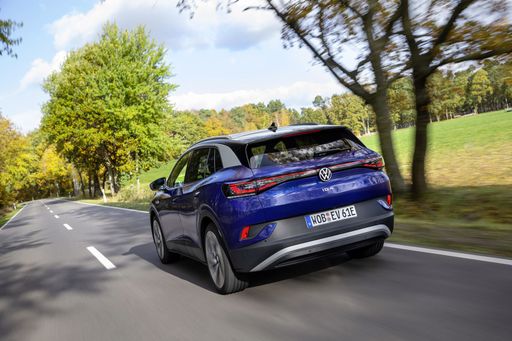 @ Volkswagen
@ Volkswagen
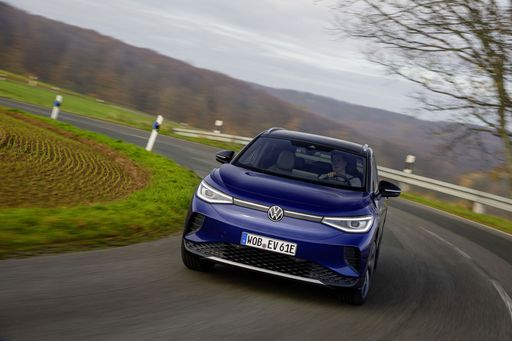 @ Volkswagen
@ Volkswagen
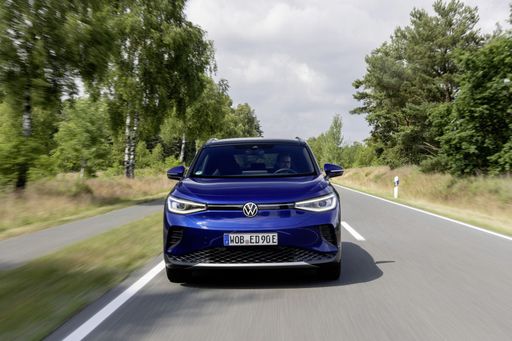 @ Volkswagen
@ Volkswagen
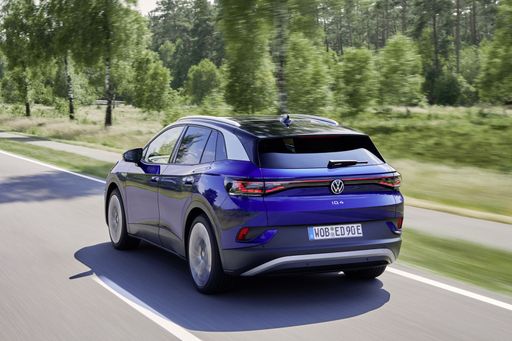 @ Volkswagen
@ Volkswagen
 @ Volkswagen
@ Volkswagen
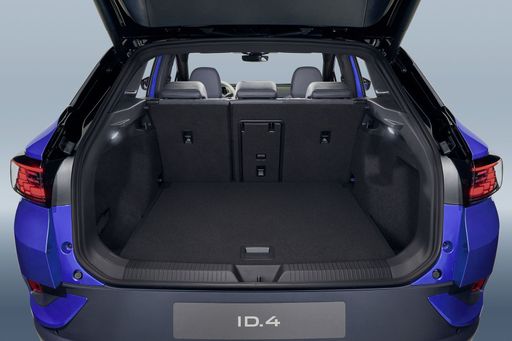 @ Volkswagen
@ Volkswagen
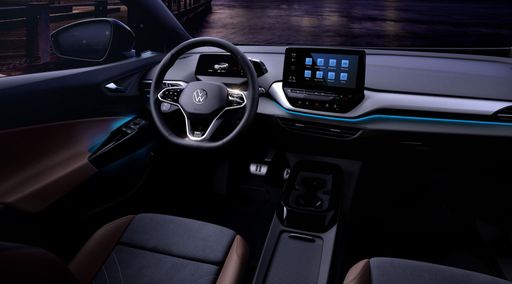 @ Volkswagen
@ Volkswagen

|

|
|
|
|
Costs and Consumption |
|
|---|---|
|
Price
29100 - 42800 £
|
Price
34600 - 47200 £
|
|
Consumption L/100km
0.8 - 5.1 L
|
Consumption L/100km
-
|
|
Consumption kWh/100km
-
|
Consumption kWh/100km
15.6 - 17 kWh
|
|
Electric Range
68 km
|
Electric Range
356 - 569 km
|
|
Battery Capacity
-
|
Battery Capacity
52 - 77 kWh
|
|
co2
17 - 115 g/km
|
co2
0 g/km
|
|
Fuel tank capacity
43 L
|
Fuel tank capacity
-
|
Dimensions and Body |
|
|---|---|
|
Body Type
SUV
|
Body Type
SUV
|
|
Seats
5
|
Seats
5
|
|
Doors
5
|
Doors
5
|
|
Curb weight
1505 - 1755 kg
|
Curb weight
1975 - 2248 kg
|
|
Trunk capacity
350 - 447 L
|
Trunk capacity
543 L
|
|
Length
4362 mm
|
Length
4582 - 4584 mm
|
|
Width
1832 mm
|
Width
1852 mm
|
|
Height
1558 - 1564 mm
|
Height
1619 - 1634 mm
|
|
Max trunk capacity
1076 - 1155 L
|
Max trunk capacity
1575 L
|
|
Payload
375 - 425 kg
|
Payload
511 - 551 kg
|
Engine and Performance |
|
|---|---|
|
Engine Type
Full Hybrid, Plugin Hybrid
|
Engine Type
Electric
|
|
Transmission
Automatic
|
Transmission
Automatic
|
|
Transmission Detail
CVT
|
Transmission Detail
Reduction Gearbox
|
|
Drive Type
Front-Wheel Drive, All-Wheel Drive
|
Drive Type
Rear-Wheel Drive, All-Wheel Drive
|
|
Power HP
140 - 223 HP
|
Power HP
170 - 340 HP
|
|
Acceleration 0-100km/h
7.4 - 9.9 s
|
Acceleration 0-100km/h
5.4 - 9 s
|
|
Max Speed
175 - 180 km/h
|
Max Speed
160 - 180 km/h
|
|
Torque
-
|
Torque
310 - 679 Nm
|
|
Number of Cylinders
4
|
Number of Cylinders
-
|
|
Power kW
103 - 164 kW
|
Power kW
125 - 250 kW
|
|
Engine capacity
1798 - 1987 cm3
|
Engine capacity
-
|
General |
|
|---|---|
|
Model Year
2024 - 2025
|
Model Year
2023 - 2025
|
|
CO2 Efficiency Class
C, B
|
CO2 Efficiency Class
A
|
|
Brand
Toyota
|
Brand
VW
|
Toyota C-HR
Revolutionising the Crossover Segment: The Toyota C-HR
The Toyota C-HR has firmly established itself as a standout contender in the compact crossover segment. Known for its distinct design and hybrid capabilities, the C-HR continues to prioritise innovation and efficiency. In this article, we delve into the technical details that make the 2024 iteration a compelling choice for discerning buyers.
Distinctive Design and Aerodynamics
The Toyota C-HR boasts a striking design that combines angular lines with modern aesthetics. This isn't merely for show; the design enhances aerodynamics, improving fuel efficiency and handling. With dimensions of 4362mm in length and a sophisticated structure, the C-HR strikes a balance between urban agility and on-road stability.
Impressive Hybrid Powertrains
The C-HR lineup offers innovative hybrid and plug-in hybrid drivetrain options. The full hybrid system is tailored for those who seek both economic and environmental benefits. It combines a petrol engine with an electric motor to deliver power outputs ranging from 140 to 223 PS, achieving remarkable fuel consumption rates from 0.8 to 5.1 L/100km. The 2.0 Plug-In Hybrid variant impresses with an electric range of 67 km, ideal for urban commuters.
Unmatched Efficiency and Performance
Acceleration figures for the C-HR range from 7.4 to 9.9 seconds to reach 0-100 km/h, ensuring a responsive driving experience. Maximum speeds between 175 and 180 km/h cater to those who appreciate a bit of zest on the open road. Coupled with CVT automatic transmission and both front-wheel and all-wheel-drive configurations, the C-HR adapts to various driving conditions with ease.
Advanced Technology and Features
Inside, the C-HR is equipped with the latest technology aimed at providing connectivity and comfort. The model hosts an array of features across its diverse trim levels, including Business Edition, Lounge, and the sporty GR SPORT. Each variant is designed to meet the demands of different lifestyles, ensuring there's a C-HR model to suit every taste.
Sustainability and Cost Efficiency
With CO2 emissions ranging from 19 to 115 g/km, the C-HR stands as a testament to Toyota's commitment to sustainability. Financially savvy consumers will also appreciate the running cost, with monthly expenses from €959 to €1204, and a cost per km as low as 38.4 cents. Such efficiency makes the vehicle an attractive option for eco-minded buyers.
Conclusion: A Forward-Thinking Choice
The 2024 Toyota C-HR embodies Toyota's forward-thinking approach to automotive innovation, blending eco-friendly hybrid technologies with stylish design and practicality. It offers a glimpse into the future of driving, where efficiency meets elegance. Whether you're a city dweller or an adventure seeker, the C-HR promises a driving experience that is both enjoyable and environmentally conscious.
VW ID.4
The VW ID.4: A Leap into the Electric Era
As electric vehicles steadily capture the automotive market, the Volkswagen ID.4 stands as a testament to impressive innovation and functionality. Combining eco-friendly technology with the practicality of an SUV, the VW ID.4 is designed to appeal to both environmentally conscious drivers and those seeking versatility in their vehicle choice. In this article, we'll explore the significant technical features and innovations that make the ID.4 a remarkable option in the electric vehicle market.
Powertrain Options: Efficiency Meets Performance
The Volkswagen ID.4 offers a range of powertrain options to suit various driving preferences. With power outputs ranging from 170 to 340 PS and torque figures between 310 and 679 Nm, the ID.4 provides a versatile driving experience. Whether you opt for the responsive rear-wheel drive or the enhanced stability of the all-wheel-drive configuration, each model guarantees smooth and efficient performance.
With an emphasis on efficiency, the ID.4 boasts a consumption rate between 15.8 and 16.8 kWh/100km, making it an economical choice for those mindful of their energy usage. Furthermore, the ID.4 offers a robust driving range, with potential distances reaching up to 572 km, reducing the need for frequent recharging and allowing for longer journeys with peace of mind.
Charging and Battery Technology
Efficiency isn't the only strong suit of the ID.4—the battery technology is equally impressive. With a battery capacity ranging from 52 to 77 kWh, Volkswagen ensures that drivers can match their vehicle choice to their lifestyle needs. Charging is straightforward and adaptable, providing convenience whether at home or on the move.
The ID.4 is designed for compatibility with a variety of charging infrastructure, ensuring rapid charging times and minimal downtime. This thoughtful engineering ensures that drivers spend more time on the road and less time waiting at charging stations.
Design and Practicality: An SUV with a Mission
The VW ID.4 embraces its SUV heritage, offering ample interior space and practicality without compromising on style. With its dimensions ranging from 4582 to 4584 mm in length, 1852 mm in width, and up to 1634 mm in height, the ID.4 ensures a comfortable and spacious environment for up to five passengers.
Additionally, the ID.4 provides a generous boot space of 543 litres, making it ideal for families or those with an active lifestyle requiring extra storage. The careful consideration in design extends to weight efficiency, with the vehicle's own weight between 1979 and 2261 kg helping to enhance its overall drive dynamics and efficiency.
Innovative Features and Technology
Volkswagen has equipped the ID.4 with a suite of advanced technological features designed to enhance both safety and driving enjoyment. These features include intuitive infotainment systems, driver-assistance technologies, and connectivity options tailored to modern expectations.
One standout attribute of the ID.4 is its commitment to sustainability with a CO2 efficiency class of A, demonstrating Volkswagen's dedication to reducing environmental impact without sacrificing performance or functionality.
Conclusion: The Future is Electric
The VW ID.4 is a shining example of how traditional automotive excellence adapts to contemporary demands for sustainability and efficiency. Whether you are an enthusiastic early adopter of electric vehicles or simply someone in search of a reliable and advanced SUV, the ID.4 offers a compelling package designed for the future.
For anyone ready to embrace the electric revolution, the Volkswagen ID.4 represents a significant step forward—a combination of forward-thinking technology, efficient design, and an emphasis on practicality. This makes the ID.4 a worthy consideration for any discerning driver looking to invest in their next vehicle.
What drivetrain options does the Toyota C-HR have?
The Toyota C-HR is available as Front-Wheel Drive or All-Wheel Drive.
The prices and data displayed are estimates based on German list prices and may vary by country. This information is not legally binding.
